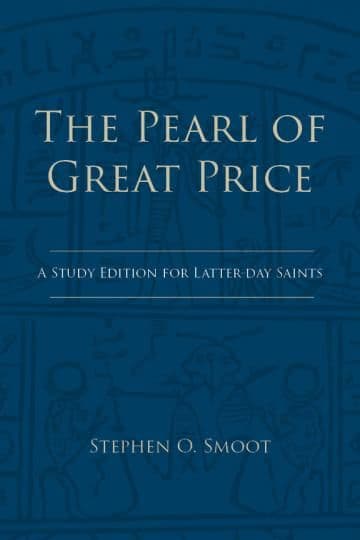Book
43 Chapters

8:1–11 The third and final genealogy of the book of Moses (compare Moses 5:42–51; 6:10–25) traces the lineage of Enoch to his great-great-grandson Noah.
8:1 And all . . . thirty years. This phrase is inserted interlineally in OT1.
8:5 The age of Methuselah. In OT1 and OT2 the age of Methuselah at the birth of Lamech is given as 187 years, but in OT1 the age was crossed out and replaced with 218 years.
8:9 Noah is said by his father to be one who will provide comfort to his family during the famine. This declaration plays on the name Noah (nôaḥ) and the Hebrew root meaning “to comfort” (nḥm).
8:12 And Noah . . . begat Ham. This entire verse is missing in OT1, which instead simply reads: “And Noah was five Hundred years old and Noah begat shem Ham and Japheth.” This was revised to the current reading in OT2.
8:13 Like Moses (see 1:4, 13), Noah and his sons are designated sons of God.
8:14–15 In the perplexing Genesis account (Genesis 6:1–2), the “sons of God” (bĕnêy ʾelohim) are depicted as divine or supernatural beings (identified as angels in some ancient sources) who cohabitated with mortal women—thus violating the divine-human boundary envisioned in Creation and provoking God to anger. Here, Noah and his sons are afforded the title “sons of God” while wicked and disobedient “sons of men” (that is, mortal descendants of Adam and Eve) are the culprits. Some ancient Jewish and Christian sources identify the sons of God in the Genesis passage as mortal men (in some instances identified as the descendants of Seth).
8:16 Here and at Moses 8:19–20, 23–24 Noah prophesies and preaches repentance, a detail missing from the Genesis account but included in multiple ancient Jewish and Christian sources (compare 2 Peter 2:5), which also highlight Noah’s outstanding righteousness.
8:18 As at Moses 7:15, here the text (compare Gen 6:4) reports giants inhabiting the earth who antagonize Noah. On the possible identity of these giants, see the commentary at 7:15.
8:24 OT1 adds “the gift of” in the promise that those who repent and are baptized shall “receive the Holy Ghost.”
8:21 The wicked inhabitants who reject Noah’s preaching falsely claim for themselves the noble status God afforded to Noah and his sons. The irony of their declaration lies in the fact that they mistakenly believe their moral autonomy and agency grants them divine status without consideration of their actions (compare Moses 4:28; Genesis 3:22).
8:24 Here Noah explicitly mentions the coming Flood for the first time in his preaching, thus fulfilling the words of the Lord at Moses 8:17 and Enoch’s prophecy at 7:41–47.
8:25–26 This revision of the King James Version of Genesis 6:6 (“it repented the Lord”) most likely reflects the Prophet Joseph Smith’s desire to avoid confusion over the connotation of the English word repent and any attending misapprehension about some supposed need on God’s part to repent for any wrongdoing. An archaic, obsolete meaning of repent captured in the King James Version is “to feel regret,” and this is indeed reflected in the underlying Hebrew (nḥm) of this verse (that is, God regretted or sorrowed at His creating humanity because of their abject sinfulness). As revised here, it is Noah who grieves over the depraved condition of humanity, which God acknowledges. The added detail that these wicked people sought Noah’s life heightens the tension of the story and provides additional justification for God’s decision to terminate humanity.
8:27 Noah is both “just” and “perfect” in his generation. These two terms in Hebrew (ṣadiq and timam) denote a sense of moral uprightness and personal integrity (but not necessarily a sense of absolute sinlessness or being free from any mortal flaw or shortcoming). Here, however, these terms take on new Christological and soteriological significance in light of the text depicting Noah as having accepted and taught the gospel of Jesus Christ as revealed to Adam and Enoch. By virtue of his righteousness and responsiveness to God’s calling, Noah finds grace or favor (ḥēn) in the eyes of the Lord.
8:30 The canonical narrative ends on the foreboding note of God announcing the “end of all flesh” and the imminent coming of the divine cataclysm. Although the Prophet translated and revised more biblical material from Genesis beyond what is present in the canonical text, the reason for the abrupt ending here is likely that no additional book of Moses material was published during Joseph Smith’s lifetime that Franklin D. Richards could draw from to include in the 1851 edition of the Pearl of Great Price.
Book
43 Chapters
Items in the BMC Archive are made publicly available for non-commercial, private use. Inclusion within the BMC Archive does not imply endorsement. Items do not represent the official views of The Church of Jesus Christ of Latter-day Saints or of Book of Mormon Central.